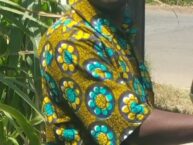
Bongani Sibanda is a Zimbabwean writer based in Johannesburg, South Africa. Born in 1990, at a village in Mat. South, he has been writing since he was a child in primary school. His short stories have appeared in two of weaver press anthologies. He has a collection of short stories due to be published in March 2016 by weaver press. He is also working on a fantasy novel. Musoke, his short story published by tuck magazine, was longlisted for the 2015 ABR Elizabeth Jolley short story prize.
The Preventer of Disasters
Things changed from the time the Preventer of Disasters’ eyes started glowing. That was one hundred and sixty seven years since he acquired his extraordinary abilities. Magical years had passed; people had started to die forever. Everyone who trod on fire was now burnt; he who stabbed himself felt the pain. There were no longer blue winged men flying about, nor riveting baritones of men squabbling about this and that in the clouds. The world was now cold and magicless as had always been.
Yet there still existed the legacy of the long-gone magic days, for example, men with penises that touched the ground and women with revoltingly stuck out buttocks who descended from the adulterous lot that was cursed as wizardry proliferated during the era of magic. And, worst of it, was the constant threats of apocalyptic natural disasters which had come about because many years ago, during the era of magic, the warring wizards’ fight with natural disasters had gone out of hand and ended up making the occurrence of natural disasters automatic regularities. So it was these disasters that Thembani, son of Mabutho, aka the Preventer of Disasters, from Matabeleland, lived to fight more than a century and a half later because he had volunteered to swallow four eggs of a cobra given him by the ingenious wizard of Maputo that bestowed him the powers to save humanity at the expense of his own well-being. Hence his remote Shashe residence in which he lived wifeless and childless and comfortless, with a diet of clay and leaves of fruit trees he planted in his yard. And the reward of supernatural powers and an everlasting life.
Before this awful change in his eyes, everything was good. Each day hundreds of his followers from all over the world thronged his one hut, Shashe residence. The Shashe ranch was the world’s most famous tourist destination, courtesy of him. Even at nighttime there were some who huddled around big fires, and graced his sad home with exultant songs and poems, until morning when he came out of his squat hut, eyes heavy due to sleeplessness, and they greeted him with wild cheers and applause, chanting Thembani! Thembani! Thembani!, some climbing peach trees to enjoy a clear view of him, others, of troubled souls like descendants of the cursed adulterers, elbowing their way through tightly packed masses to touch his supposedly healing hands, until the ever-present security had to deter them with mopane sticks. The world worshipped the Preventer of Disasters so much not only because he protected humanity from destruction but also because he interfered in world affairs and ensured good governance, equality, and at one time he had facilitated the ousting of an eighty-two-year-old Mthwakazian tyrant who had ruled for more than five decades, owning everything — chickens, goats, dogs and even his people’s homes and destinies under the pretext of protecting them from imperialism.
Sometimes his fans asked him to talk about the latest disaster he had prevented, to say what it was, and how strong it was, estimate the amount of damage it could have caused, and even relate how much pain he had endured while battling it. It was generally known how disasters affected him, that he groaned and writhed and foamed as he absorbed and diffused their waves, but if that had anything to do with his usual reaction to this question was never found out. For, every time this question was asked, for a few minutes the Preventer of Disasters’ jaws moved soundlessly. His speech would only become distinct after a very long time. And, with clinical precision, he would narrate everything — the location of that earthquake, volcano, tsunami, flood, whatever the disaster may have been, and how many people would have died, and end with showing the masses the wounds he had incurred while battling it, yet not in a way to solicit sympathy. For the Preventer of Disasters was not the kind man to solicit sympathy from his followers.
Yet still, there was nothing as unmistakable as happiness in his eyes. Sorrow he could hide, but excitement he could not. Every day smartly-uniformed bands and choirs from different parts of the world diverted him with music and dances. And, through his unblinking eyes and frozen state of concentration, everyone could tell that he relished these moments; that he enjoyed the choirs’ moving songs, their harmonious voices, the bands’ well-choreographed dances, their thematic substances, and was even pleased by the intensity in all the performances more than anybody.
So what could have caused this tragic change in his eyes? This was a matter for debate. The spiritual-minded suggested it came from within him, that it was a reflection of how he had begun to see the world. They argued that there was a rift between the way he saw the world when he volunteered to become the Preventer of Disasters and how he had come to see it now a century and a half later. Yet the simple-minded disagreed, and simply said this was merely a fulfillment of destiny; they postulated that it had always been destined since the beginning of time, that at such and such a time, the Preventer of Disasters’ eyes would start glowing like coals. For there was nothing singular about that summer afternoon, the day was warm and sunny like all summer days, and he was standing on his usual outcrop talking about the latest earthquake he had prevented, frequently pausing and pacing about as always, when his eyes suddenly changed red and, as the masses watched in horror, the red suddenly deepened into the glow of hot coals.
The first personality change that accompanied this was loss of interest in the afternoon’s reveries. He spent his afternoons alternately gazing at people and up his fruit trees with his glowing eyes as if he meant to cast an evil spell on everything. In the next months he did not even touch any of the clay and fresh leaves some fans usually brought him. He also developed a habit of shutting himself up in his hut for days or even weeks on end.
This kind of behaviour continued for many months. The Preventer of Disasters became thin like toothpick because of not eating enough, his melancholy deepened, and the hours he spent shut in his hut increased to such an extent that at some points even his most devoted fans who held uninterrupted vigils in front of his hut, day and night, did not see him for close to a month. Yet still that was not the worst of it.
The worst came one ill-starred summer noon of November twenty nine. The day had broken out cool and sunny, the indefatigable fans had attended in droves and packed themselves in front of his hut singing his praise songs and, as usual, begging him to come out and bless them with his glorious presence when, suddenly, the Preventer of Disasters stormed out of his hut, thin and gaunt like a living corpse and, as if prompted by some invisible force, started converting enthusiastic masses into different things. By just pointing his long thin index finger at them, and muttering something in his breath, he turned an elegantly dressed grandmother into a watermelon, a nineteen-year-old school boy who wore a sunhat into a teak tree that bore rotten bananas, a Swedish young couple that stood holding hands into a mating pair of huge brown race horses. And yet these were not the worst.
The most heart-rending of these horrors was when he changed a young mother who was seated under a mango tree into a retired corner breastfeeding her twins into a hare suckling its three leverets. And all the more devastating in this case was that the young woman, as a hare, could talk and act like a human being; her senses must have been dulled, for, instead of exclaiming at her new horrendous state and asking for redemption, the poor woman kept talking to herself and thinking aloud her plans to convince her husband to remove the lawn and pave the courtyard of their home like she were some sophisticated carnival product. It was both sad and humorous. The people watched this horror near with shock. Although all the dignitaries had sneaked out and escaped following the first horror, it was later reported that as they escaped, the President of Maputo was transformed into a rooster with human legs and mouth because he had sworn while in his car that the Preventer of Disasters was now turning into shit. He had promptly returned back to beg the Preventer of Disasters to change him back. And had appeared to find others, mostly relatives of the converted people, celebrating the changing back of their loved ones by the now benevolent Preventer of Disasters.
Hearing the sound of a car, the people turned around at once and saw the horrific image of a rooster with a mouth and human legs coming out of a cream limousine and walking straight down the narrow trail to the Preventer of Disasters’ hut with a hilarious gait. The Preventer of Disasters had again shut himself in his hut as soon as he got done with changing back his victims. The rooster knocked on the plank door using its human feet. Nobody among the public could have guessed that it was his Excellency Dr. Alexandra Mabunda, had he not started asking for mercy with his baritone voice, telling the apathetic Preventer of Disasters that he only needed a second chance in life. His country was experiencing a time of crisis, it needed him.
So all this and more marked a new era in the days and times of the Preventer of Disasters; a new era wherein fear ruled the whole world. And from that day on, even the most committed of his empathizers refrained from visiting him, and when he countered this by ignoring some disasters, letting earthquakes, volcanoes and hurricanes reign, prisoners were trucked to him every day to pose as his worshipers. But the Preventer of Disasters was not to be so easily tricked. He soon proclaimed that he wanted billionaires and heads of states at his service, each at least once a week. And when it was finally realized that begging invariably helped in making him change back his victims, a begging committee was established. But one thing remained a puzzle, though: the Preventer of Disasters would cry when he had to change back his victims. He would shed tears in front of the public. Or sometimes, with a strange public display of emotion, even more strange considering his age and his former stoic character, he would strut about, and repeatedly stamp his right foot hard on the ground, mouth pouted, his hands clasped in the back of his head. And snap:
“The bastards deserve it!”
He had become incomprehensible. He had become a puzzle. He had become good. He had become bad. Sometimes he apologized for all his cruel pranks, but then went on to do worse. At one time he had cut all the prisoners’ heads and hands and impassively watched their headless bodies walk into trees all day. Other times he changed trees in his yard into mysterious, carnivorous beasts that had the prisoners run everywhere with fear. And one September afternoon he had compelled all presidents and billion-dollar men of the world to come see him, and while they still talked fervently, waiting for him to come out and address them, he had stormed out of his hut like someone possessed and, with an incoherent utterance and wild skipping about and waving of his hands, submerged them all in a whirlpool of sewage water he had created with his magical hands. It was from that day that all important people swore never to visit him ever again no matter what. But for unknown reasons, that became the last of his pranks. And even when after a long time some resumed visiting him, he politely turned them all away, told them he wanted to spend the rest of his life alone.
Thus left to his solitude, the Preventer of Disasters lived for many years and was seen restlessly planting and tending to his fruit trees by those who couldn’t resist occasionally paying him a visit and standing afar to watch. And very soon, as stories about him disappeared from the media, even the world soon forgot about him, that the absence of natural disasters was due to a suffering soul sentenced to solitude in the deep Shashe woods.
Normal life continued in the world. Presidents were out voted here and there dictators clung to power until they were assassinated, while the rich continued getting richer and the poor poorer, and drought ruled in other places while good rains graced others, and there was nothing to make anybody believe that in the midst of such normality the world was at the mercy of an unhappy man in Shashe, nor anything to make anybody believe that strange things once happened in such a normal world except, of course, just one incident of a ninety-one-year-old Nigerian man who turned himself into a nine-year-old boy without a mother, and most people did not believe it, of course, not only because of the unlikeliness of such a singular thing in such a normal world nor because there was no proof since the kid had a smooth skin of a kid, talked like a kid, had ears and mouth of a kid, behaved like a kid, and would also not change himself back into his old age, but because something like that, something so mysterious, was officially improbable in such a normal world as this we live in today. And despite that some positively affirmed the transformation had really occurred, some thought so ill of the prank that they even suggested the kid ought to be arrested and tortured until he revealed the truth about his origins and the whereabouts of the old man.
The Preventer of Disasters was not heard from all this time until many many years later when an eighteen point four earthquake hit North America, destroyed trillions’ worth of property and killed millions of people. It was then a team of anthropology students from the University of Mthwakazi who had heard rumours of his existence from old books at library rushed to check on him as soon as they heard news of the disaster. With horror, they found him dead, lying supine in the open space in front of his hut with his mouth open. He had been dead for more than two hundred and eighty-eight hours; they could tell from the smell of his decomposing body and the kind of flies that had come to attack his bones. And when one of them casually pecked with a log at the mound of green greyish clay that was clearly the last thing he had vomited before his death, thinking he might have accidentally killed himself by ingesting a large object buried in the clay, they were shocked to discover the four, brown eggs of a cobra he had swallowed two hundred and thirty one years ago still intact in his vomit. And they simultaneously nodded, staring at one another, the biggest mystery of existence dawning on them.



